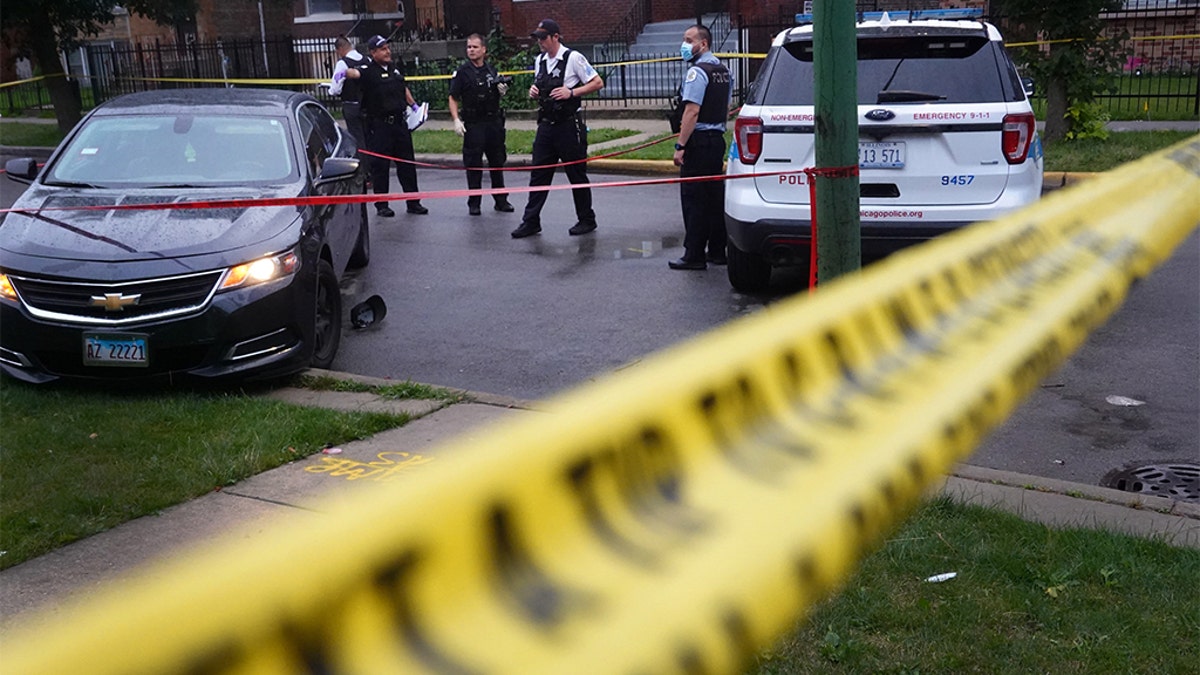Murder rates saw a "historic" increase in 2020 compared to 2019, with more than 1,200 additional killings year-over-year in a sample of 34 American cities, according to a study released Monday.
"The coronavirus pandemic, continuing incidents of police violence, and rising homicide and violent crime rates each pose massive policy challenges in their own right, but the interplay between them creates even more difficult decisions for policymakers," states a report from the National Commission of COVID-19 and Criminal Justice (NCCCJ). "Despite this difficulty, leaders at all levels of government should take bold action in responding to all three crises."
Homicide rates jumped by 30% from 2019 to 2020, while gun assault and aggravated assault rates climbed 8% and 6%, respectively, experts found.
POLICE, LAW ENFORCEMENT HAVE BEEN HOT-BUTTON ISSUE IN 2020
"Homicide rates were higher during every month of 2020 relative to rates from the previous year," the report states, calling the 30% surge "a large and troubling increase that has no modern precedent."
Experts analyzed the data from as many as 34 U.S. cities, which varied in size and population, for year-over-year changes in 10 different areas of crime for the year-end update of an NCCCJ report called Pandemic, Unrest, Crime, and Violence in U.S. Cities. In addition to the three offenses listed above, the report examined the rates of domestic violence, robbery, residential burglary, nonresidential burglary, larceny, motor vehicle theft and drug offenses.
The rates of homicides, motor vehicle thefts, gun assaults and aggravated assaults rose year-over-year. Meanwhile, those related to drug offenses, larcenies, nonresidential burglaries, residential burglaries and robberies all decreased during the pandemic and during the year as a whole compared to 2019, analysts found.
Not every city provides the same kinds of data, and sample sizes for certain types of offenses were smaller than others.
As for domestic violence, analysts were only able to examine data from 12 cities. They found that there was "a significant increase" in these types of offenses during the early months of the COVID-19 pandemic, but the rate then leveled out to be roughly the same as it was in 2019.
The average population of the cities whose homicide rates were examined was 978,000, but the cities range in size. The largest city in the sample, New York, boasts a population of approximately 8.42 million people, while the smallest, Norfolk, Va., has 245,000 residents, the report states.
Analysts examined cities’ aggravated assault rates to find that they were, on average, just over 6% higher than in 2019, with 6,741 more instances in 2020 than the year prior. Meanwhile, experts reviewed the gun assault data for 15 cities and found that the rate climbed nearly 8%, with 3,557 more offenses.
In terms of homicides, the report examined only those that were criminal in nature and defined homicides as being "deliberate and unlawful killings of one human being by another."
Analysts found that homicide rates, like most of the other crimes examined, follow a "clear cyclical pattern" over time – rising during the summer months and falling in the autumn and winter. But in 2020, murder rates "exceeded previous rates throughout the entire year."
"[T]here was a structural break in the city average in June, indicating a large, statistically significant increase in rates after adjusting for seasonality and the longer-term trend," the report states. "After this break, homicide rates increased sharply through July then declined through the end of the year, though not to levels observed in the prior year."
January and February 2020 saw a combined homicide rate increase of 32.5% compared to the same time in 2019. March through May saw a 19.4% surge, while June through August experienced a 37.2% rate increase and September through December reported a 28.2% spike year-over-year.
Analysts found that the pandemic likely "temporarily suppressed" some murders because it limited "opportunities for offenders and victims to interact." But as COVID-19-related restrictions were slowly lifted, or public concern waned in the spring and summer months, homicide rates rose.
Despite the decrease during the height of the COVID-19 shutdowns, analysts believe the pandemic "may have increased the commission of homicides in multiple ways."
The pandemic "disproportionately affected vulnerable populations" by creating more stress, whether physical, mental or financial, experts found. It also further strained those groups and institutions tasked with responding to or treating violent crimes, such as police, hospitals, emergency medical services, community groups and courts.
"COVID-related restrictions may have had an initial suppressive effect on homicides, but the waning of those restrictions, coupled with the strain on at-risk individuals and key institutions – aggravated further by the lack of outreach to such individuals – have all likely contributed to elevated homicide rates in 2020," the report notes.
Analysts also noted a "precipitous rise" in murders during the emergence of civil unrest and protests following George Floyd’s death but added: "the connection between police violence, protests and social unrest, and heightened community violence remains uncertain." They also said they have found so far that "no simple connection exists" between the trio.
PROTESTS, RIOTS THAT GRIPPED AMERICA IN 2020
In all, homicide rates in 2020 were 30% higher than in the year before, with 1,268 more murders in the 34-city sample alone, the NCCCJ found. Murders rose in 29 of the 34 cities examined, or 85%.

Police investigate the scene of a shooting in the Auburn Gresham neighborhood on July 21, 2020, in Chicago. (Scott Olson/Getty Images, File)
"Homicides increased in nearly all of the 34 cities in the sample," the experts wrote. "In the authors’ view, urgent action is necessary to address these rapidly rising rates. Subduing the pandemic, increasing confidence in the police and the justice system, and implementing proven anti-violence strategies will be necessary to achieve a durable peace in the nation’s cities."
The report notes that the federal government will provide a "final determination" when it releases its official year-end crime statistics in the coming months.
It also notes that while the one-year increase "is cause for concern," the absolute homicide rate remains "well below historical highs."
"In 2020, in sample cities the homicide rate was 11.4 deaths per 100,000 residents; twenty-five years earlier, in 1995, the rate for the same sample was 19.4 deaths per 100,000 residents.
"And several of the starkest increases were reported in "smaller cities with very small homicide counts, where even a few additional homicides can produce a large percentage change," the report states.
"But large increases in homicides were not limited to smaller cities," the experts wrote.
CLICK HERE TO GET THE FOX NEWS APP
In Chicago, there were 278 more murders in 2020, which equated to a 55% surge year-over-year, while New York City’s 131 added homicides accounted for a 43% jump, the report found.
"The three largest cities (New York, Los Angeles, and Chicago) accounted for fully 40% of the 1,268 additional people killed in 2020," the experts wrote. "While there is variation among the cities, what is most notable is that homicide (sic) rose substantially in the vast majority of them."



























